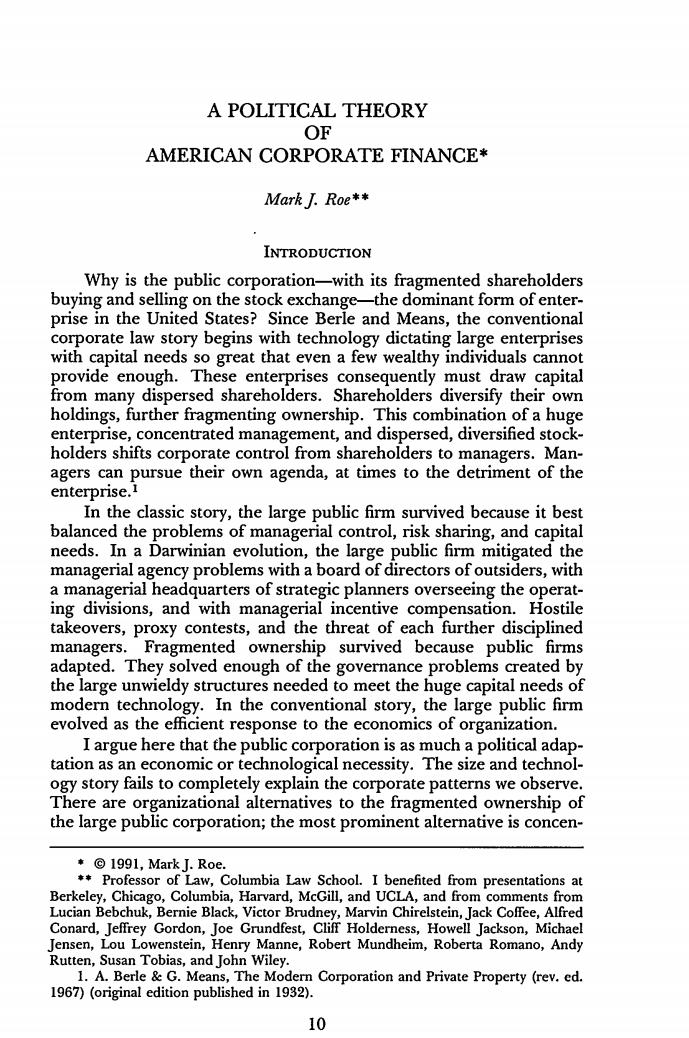正在加载图片...

A POLITICAL THEORY OF AMERICAN CORPORATE FINANCE* Mark I.Roe** INTRODUCTION Why is the public corporation-with its fragmented shareholders on the stock excha the d omin ant form of ente Since Berie and Means,the conventional corporate law story begins with technology dictating large enterprises with capital needs so great that even a few wealthy individuals cannot provide enough.These enterprises consequently must draw capital from many dispersed shareholders.Shareholders diversify their own holdings,further fragm nting ownership. This ation of a huge enterprise ,concentrated management,and dispersed,diversified stock holders shifts corporate control from shareholders to managers.Man- gerscan pursue their own agenda,at times to the detriment of the survived because it best bala needs.In a Darwinian evolution,the large public firm mitigated the managerial agency problems with a board of directors of outsiders,with a managerial headquarters of strategic planners overseeing the operat- isions,and with ncentive Co. Hostile takeovers,proxy contess and the threat managers. Pomentedd adapted.They solved enough of the governance problems created by the large unwieldy structures needed to meet the huge capital needs of technology.In the conventional story,the large public f modern technolo ient respo onse to the economics of orga Iargue here that the public corporation is as much a political adap- tation as an economic or technological necessity.The size and technol- Tmereeented w nted ownership of the large public corporation;the most prominent alternative concen- t©l99l.Mark I.Roe Professor of Law,Columbia Law School.I benefited from presentations at Lucketer.Chicngo Columbia.Harvard:McCill.and OcI stein, Coffee, Andy Rutten,Susan Tobias,and John Wiley. 1.A.Berle G.Means,The Modern Corporation and Private Property (rev.ed. 1967)(original edition published in 1932). 10A POLITICAL THEORY OF AMERICAN CORPORATE FINANCE* MarkJ. Roe** INTRODUCTION Why is the public corporation-with its fragmented shareholders buying and selling on the stock exchange-the dominant form of enterprise in the United States? Since Berle and Means, the conventional corporate law story begins with technology dictating large enterprises with capital needs so great that even a few wealthy individuals cannot provide enough. These enterprises consequently must draw capital from many dispersed shareholders. Shareholders diversify their own holdings, further fragmenting ownership. This combination of a huge enterprise, concentrated management, and dispersed, diversified stockholders shifts corporate control from shareholders to managers. Managers can pursue their own agenda, at times to the detriment of the enterprise.' In the classic story, the large public firm survived because it best balanced the problems of managerial control, risk sharing, and capital needs. In a Darwinian evolution, the large public firm mitigated the managerial agency problems with a board of directors of outsiders, with a managerial headquarters of strategic planners overseeing the operating divisions, and with managerial incentive compensation. Hostile takeovers, proxy contests, and the threat of each further disciplined managers. Fragmented ownership survived because public firms adapted. They solved enough of the governance problems created by the large unwieldy structures needed to meet the huge capital needs of modern technology. In the conventional story, the large public firm evolved as the efficient response to the economics of organization. I argue here that the public corporation is as much a political adaptation as an economic or technological necessity. The size and technology story fails to completely explain the corporate patterns we observe. There are organizational alternatives to the fragmented ownership of the large public corporation; the most prominent alternative is concen- * © 1991, MarkJ. Roe. ** Professor of Law, Columbia Law School. I benefited from presentations at Berkeley, Chicago, Columbia, Harvard, McGill, and UCLA, and from comments from Lucian Bebchuk, Bernie Black, Victor Brudney, Marvin Chirelstein, Jack Coffee, Alfred Conard, Jeffrey Gordon, Joe Grundfest, Cliff Holderness, Howell Jackson, Michael Jensen, Lou Lowenstein, Henry Manne, Robert Mundheim, Roberta Romano, Andy Rutten, Susan Tobias, and John Wiley. 1. A. Berle & G. Means, The Modern Corporation and Private Property (rev. ed. 1967) (original edition published in 1932)